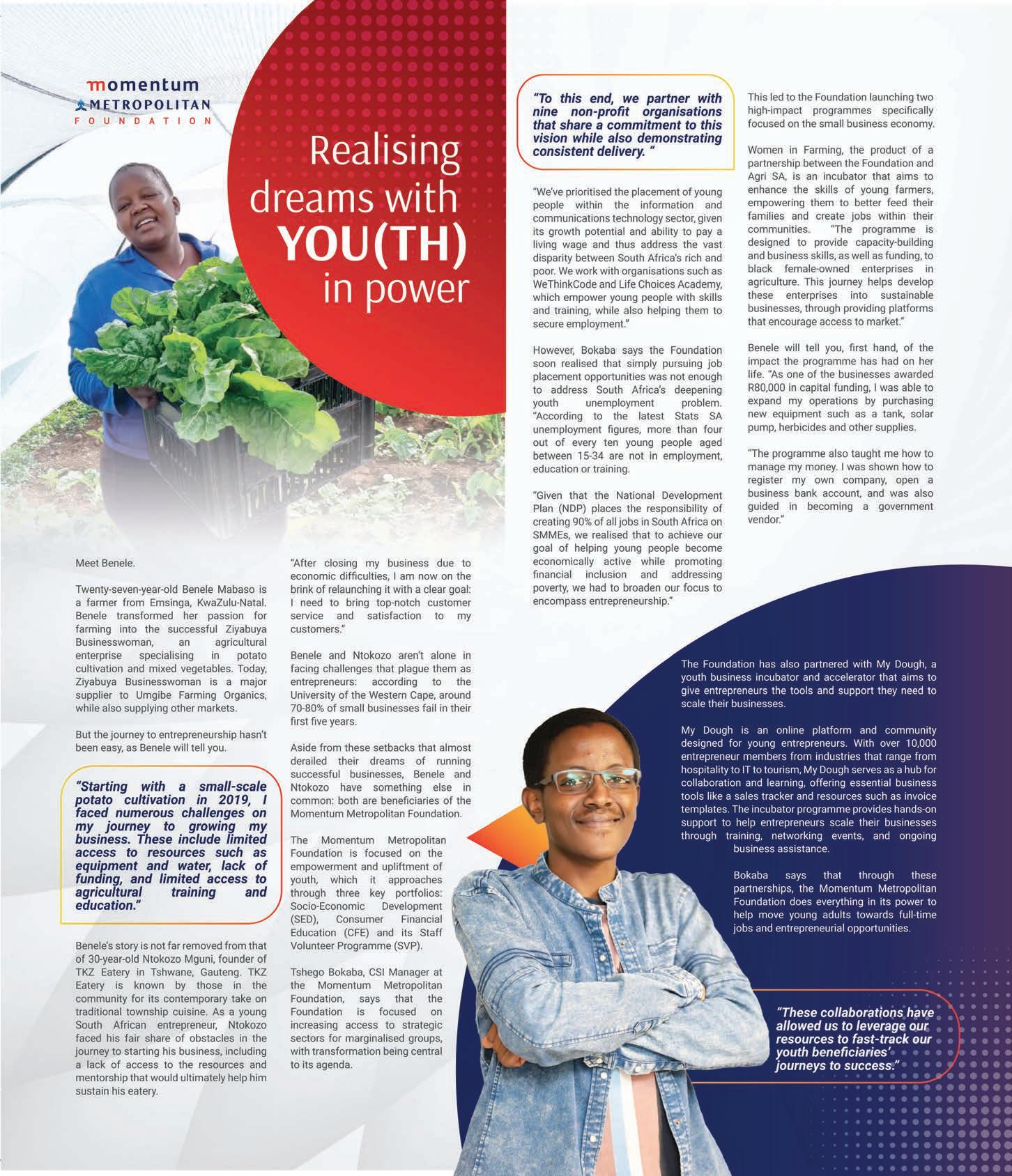









In conversation with




















In conversation with










The South African Mathematics Foundation (SAMF) is best known for being the organiser of two of the country’s largest mathematics competitions – the Mathematics Challenge (SAMC) for primary school and the Mathematics Olympiad (SAMO) for high school learners. Committees that design the mathematical problems for the question papers for these competitions are deliberate in presenting learners with non-curriculum problems that require participants to think out of the box and apply critical thinking to solve them.
Although both competitions have been around for more than 40 years, the SAMF started building a community for youthful problem-solvers when it took over the administration of the Olympiad in 2005 and the Challenge in 2011. For the past 20 years, the SAMF and its many volunteer mathematics coaches have worked endlessly to create a space where South Africa’s youth can bond and form lifelong friendships with others who enjoy solving puzzles, riddles and mathematical problems.
MATHEMATICS

Malwande Nkonyane (23) and Kgaugelo Bopape (21) say participating in the SAMF’s mathematics competitions is not an event but rather a journey. Malwande was born in Johannesburg and grew up with two sisters. His father is an engineer and his mother is a full-time parent. Growing up, his parents supported his talent for solving complex mathematical problems and encouraged him to do so. His first encounter with a mathematics competition was in Grade 6. He remembers how much he enjoyed the questions being different – it allowed him to think logically about finding ways to solve the puzzles. While in high school, he started participating in the SAMO, and although the questions were very challenging, they inspired him to practise his problem-solving skills.




Mathematical Olympiad (IMO) and Pan-African Mathematics Olympiad (PAMO) from among those who attended these training camps.
Kgaugelo, who grew up in Johannesburg alongside ve siblings and his father, an electrician, and mother, a nurse, also received full support from his parents. They ensured he had access to the SAMF mathematics coaches and training camps. In 2020, he became the country’s rst African learner to earn a medal at the International Mathematics Olympiad in St Petersburg, Russia. Kgaugelo says for many mathematically gifted learners nationwide their biggest barrier to success is the lack of parental support.
Malwande and Kgaugelo forged a friendship when the SAMF selected them to represent the country in the 2018 Pan-African Mathematics Olympiad. Malwande was in Grade 12 and Kgaugelo in Grade 10 at the same high school when they travelled to Nairobi, Kenya for the competition. The team of six learners, a team leader and a deputy team leader practised solving mathematical problems for weeks on end, and the team walked away as the winners of this prestigious competition.
Fast-forward to 2024 and Malwande (an investment analyst) is the team leader of the country’s team with Kgaugelo (a mathematics honours student) as the deputy team leader. This year’s Pan-African Mathematics Olympiad takes place at the University of the Witwatersrand in Johannesburg from 12 to 22 August. As team leaders, they are responsible for coaching the team of six and preparing them for two tests, consisting of three mathematical problems each, over two days. These tough questions require understanding, creativity and analytical thinking supported by strict evidence if the learners want to follow in the footsteps of their youthful mentors.

As part of the Olympiad, the SAMF organises mathematics training camps for talented learners throughout the year. At these camps, the learners receive coaching from mathematics experts who help them prepare for international participation. Each year, the SAMF selects two teams of learners to represent South Africa in the annual International


The SAMF plays a signi cant role in helping South Africa’s youth forge bonds through numbers. Malwande and Kgaugelo, along with hundreds of other youths, are proof of the positive outcomes of the mathematical communities that developed from their journeys of the Mathematics Challenge and Olympiad. Here’s to the next 20 years of cultivating a community of mathematics enthusiasts!

For the past 20 years, the SAMF and its many volunteer mathematics coaches have worked endlessly to create a space where South Africa’s youth can bond and form lifelong friendships with others who enjoy solving puzzles, riddles, and mathematical problems.





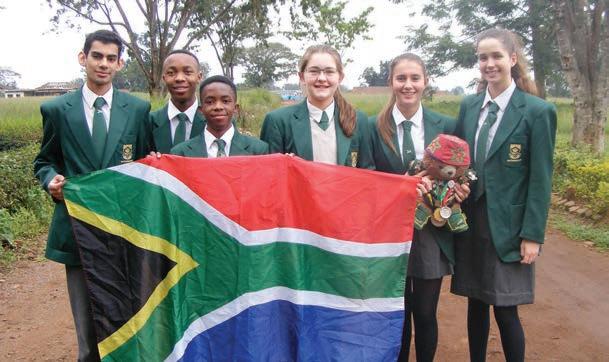

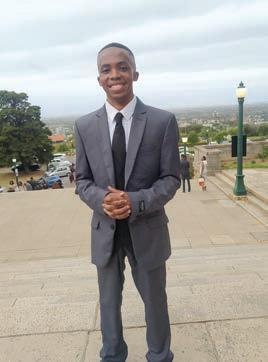


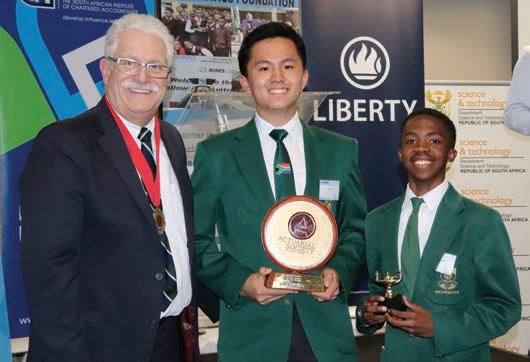
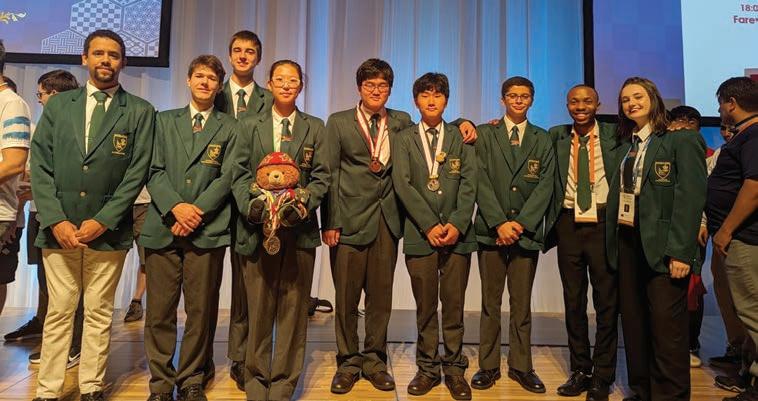




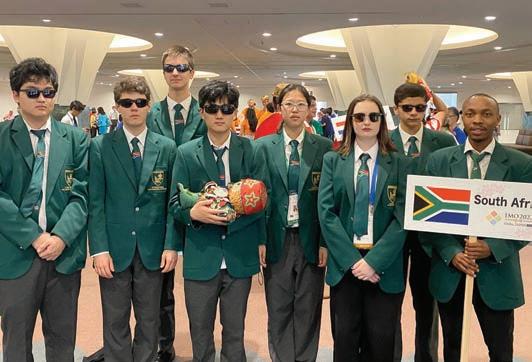


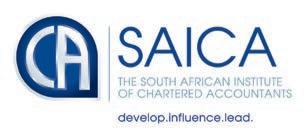
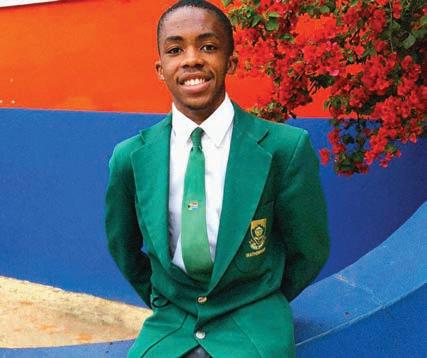



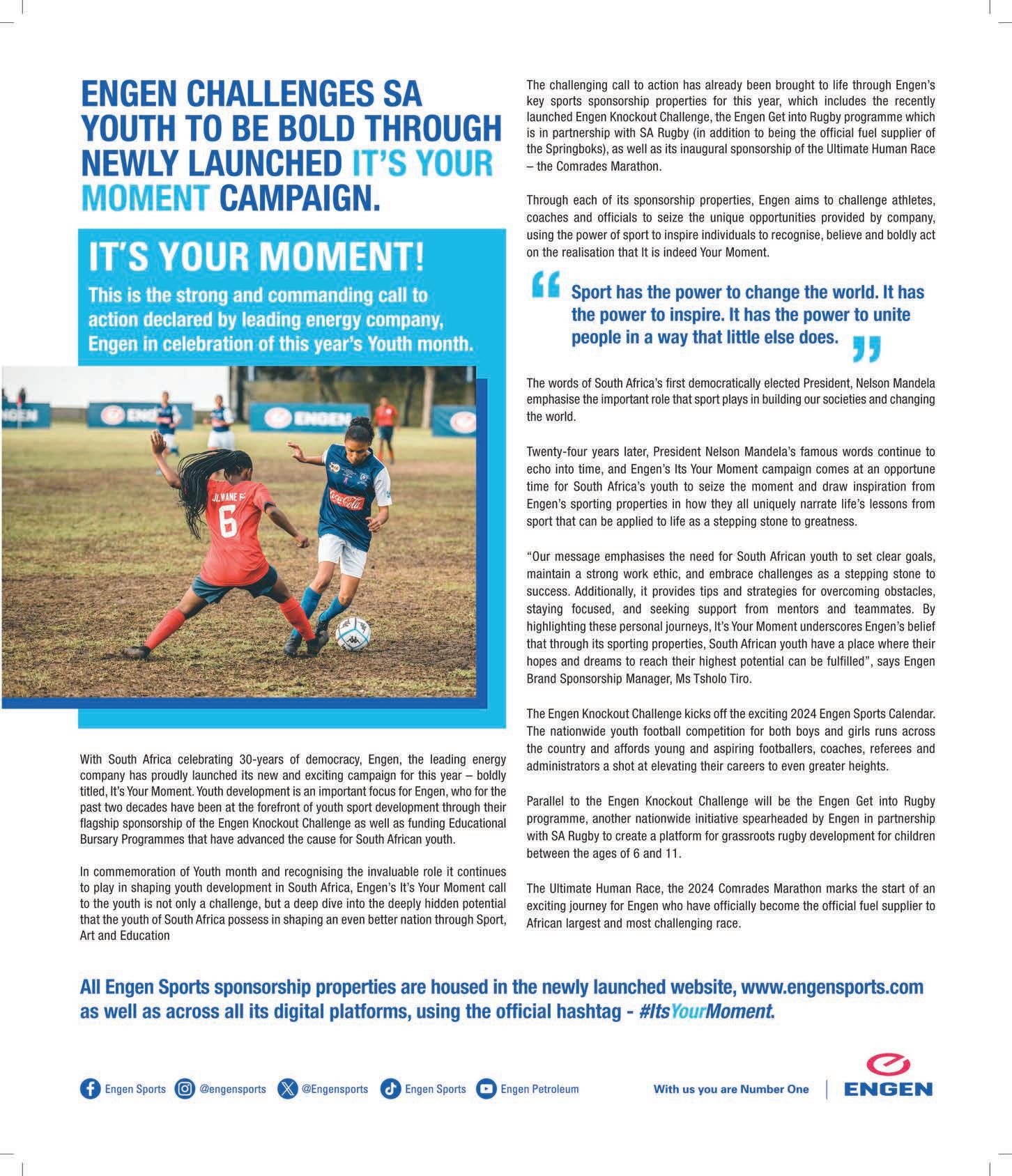


PUBLISHED BY
Picasso Headline,
A proud division of Arena Holdings (Pty) Ltd, Hill on Empire, 16 Empire Road (cnr Hillside Road), Parktown, Johannesburg, 2193 PO Box 12500, Mill Street, Cape Town, 8010 www.businessmediamags.co.za
EDITORIAL
Editor: Ryland Fisher
Content Manager: Raina Julies
rainaj@picasso.co.za
Contributors: Trevor Crighton, CG Selva Ganesh, Nadia Lubowski, Candice Luis, Rajan Naidoo
Copy Editor: Brenda Bryden
Content Co-ordinator: Natasha Maneveldt
Digital Editor: Stacey Visser vissers@businessmediamags.co.za
DESIGN
Head of Design: Jayne Macé-Ferguson
Senior Designer: Mfundo Archie Ndzo
Advert Designer: Bulelwa Sotashe
Cover Images: Supplied, Sinisa Vidic/istockphoto.com
SALES
Project Manager: Jerome van der Merwe jeromem@picasso.co.za | +27 21 469 2485 +27 820 668 1496
Sales: Frank Simons
PRODUCTION
Production Editor: Shamiela Brenner
Advertising Co-ordinator: Johan Labuschagne
Subscriptions and Distribution: Fatima Dramat, fatimad@picasso.co.za
Printing: CTP Printers, Cape Town
MANAGEMENT
Management Accountant: Deidre Musha
Business Manager: Lodewyk van der Walt
General Manager, Magazines: Jocelyne Bayer





This publication traditionally focuses on issues affecting young people in our society. This year, as South Africa marks the 30 th anniversary of our democracy, we use the opportunity to re ect on the views of people younger than 30 years old, those who were born into our democracy and who never felt the pain caused by apartheid. Their views re ect a maturity that goes way beyond their years, combined with an understanding that democracy has served up some good, but also some bad. Clearly, while there are many challenges in South Africa, it is not all doom and gloom.
As usual, we look at some of the issues facing young people, including unequal education, which contributes to the vicious cycle of poverty in our country. We also look at some existing initiatives to tackle unemployment and the opportunities presented by sectors such as agriculture and technology.
The views expressed in this publication – of young people and others dealing with issues facing the youth – give us a sense of optimism for the future of our country. Maybe, just maybe, we will be able to realise the better society that we all deserve in the next 30 years of democracy, but hopefully, much sooner.
We hope you enjoy the read.
Ryland Fisher, Editor
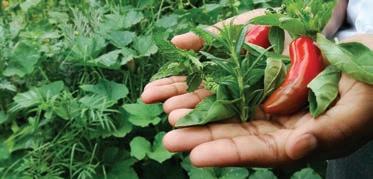
We chat to South Africa’s born-free generation and nd out that, generally, our youth appear to be positive, albeit with reservations, about our democracy and South Africa’s future.
The agriculture and technology sectors offer tremendous potential and diverse job opportunities for young people.
There is an urgent need to break the cycle of poverty through quality education.


Mentorship programmes are vital for equipping students with real-world knowledge and soft skills to enter the world of work.
Young people’s potential as change catalysts cannot be underestimated. Motivating and empowering the youth to transform their social impact ideas into actionable elements is integral to society’s development and economic growth.
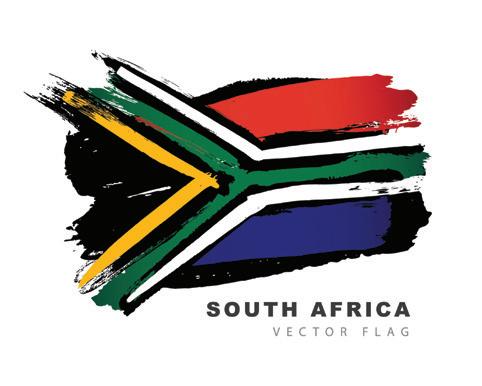
Read our

Young people generally appear to be positive, albeit with reservations, about our democracy and South Africa’s future, writes RYLAND FISHER
Elzé van Achterbergh, Xolisa Gwadiso, Paul Fredericks, Nalia Jasmine Walsh, Mbalentle Lutya, Jordan Benson, Danté Davids, Cally Jaftha, Amber Julius, Tatum Leigh Russell and Faeeza Lok have one thing in common: they are all under 30 years of age, which mean they were born in South Africa’s democracy. They are also all passionate about South Africa despite the many problems we face as a society.
Van Achterbergh was born in Bloemfontein in 1997, but grew up in Bahrain and returned to South Africa to study at Stellenbosch University. She now lives in Kuils River, Cape Town. She describes herself as “a white South African with an Afrikaans family”. She says she has been diagnosed with autism, has an autoimmune disease and is a lesbian. “Obviously, this all affects how I experience and view the world.”
Van Achterbergh says she has to be positive about the future of South Africa. “No other country will accept me with my health issues. I would be agged as too much of a burden on their healthcare system,” she explains.
If she became president, she would focus on healthcare, queer rights, energy policy, the economy and rooting out corruption and crime.
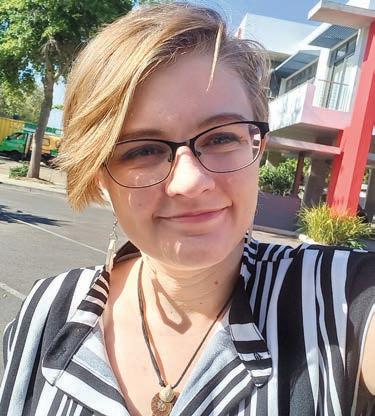
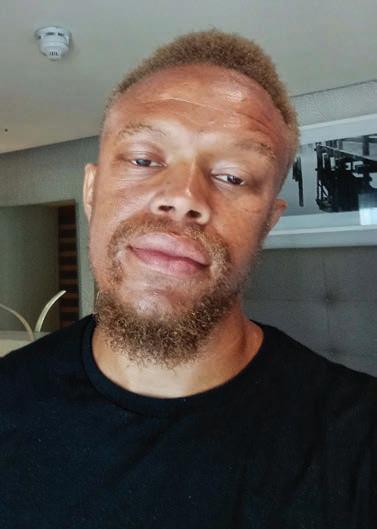
Gwadiso was born in Cape Town in 1999 and grew up in Samora Machel township. He still lives in the township “for now”. He is completing his master’s degree in research psychology at the University of the Western Cape.
He realises that, through democracy, “we have had increased access that we never had previously. But at the same time, our access is limited by what one can afford. Historically speaking, the people who couldn’t always afford were people of colour. I had hoped democracy would have recti ed this issue in our country, but we still have economic apartheid”.
Gwadiso says he is positive about the future of South Africa and believes “the youth will have its grand uprising and take what is rightfully theirs”.
“I am well aware of the importance of experience, wisdom and overall know-how that some of our elders in society have. I’m always grateful for it, but many of our parliamentarians have not demonstrated good practice.”
Fredericks is a 23-year-old BA Humanities graduate who was born in Paarl. He grew up in Cape Town, lived for a while in Pretoria and now lives in Kuils River.
He says: “Our democracy has treated me well. We cannot forget our history and past as a country. We live in an amazing country with incredible citizens, and they have all contributed to a democratic society. I have de nitely bene tted. However, we cannot be ignorant as there are many my age and younger who are still dealing with the long-lasting effects of apartheid and not reaping the bene ts of what a democratic society ought to be.”
Fredericks says if the president focuses on “developing our strengths within an economic sphere (our agricultural and tourist industries) while trying to work on a plan to build on our weaknesses (unemployment, crime, poverty), we can de nitely move forward”.
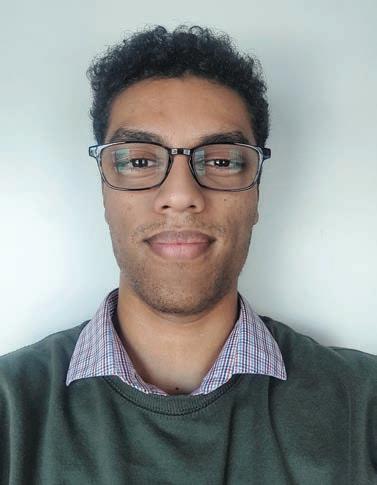
“THERE ARE MANY MY AGE AND YOUNGER WHO ARE STILL DEALING WITH THE LONG-LASTING EFFECTS OF APARTHEID AND NOT REAPING THE BENEFITS OF WHAT A DEMOCRATIC SOCIETY OUGHT TO BE.” – PAUL FREDERICKS
Walsh is 20 years old and lives in Cape Town. She is pursuing a bachelor of commerce (general) degree at Eduvos. She says she was “born into a family facing the challenges of teenage pregnancy, which meant my parents had to juggle multiple jobs to support my brother and me. Despite the obstacles, they worked tirelessly to provide us with the best possible life”.
Walsh says South Africa’s democracy “has provided opportunities for growth and education, allowing me to pursue my dreams despite facing initial challenges. However, like many South Africans, I have also encountered obstacles such as limited job opportunities and economic instability”.
She adds: “While I recognise the achievements of the democratic government, a lot of the challenges we face are due to the inability to deal with corruption, poor economic policies, resulting in a lack of private investment and appointing incompetent people in crucial positions.”
She believes that more could be done for young people in South Africa. “Accessible education and job opportunities are crucial for empowering individuals to contribute meaningfully to society.”
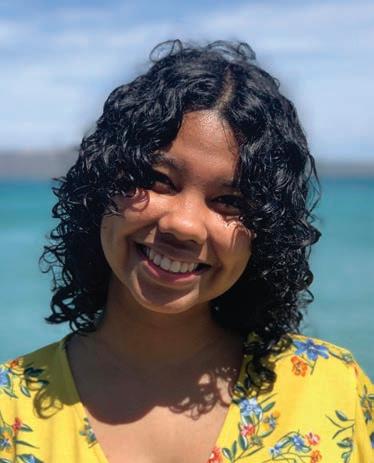
“ACCESSIBLE EDUCATION AND JOB OPPORTUNITIES ARE CRUCIAL FOR EMPOWERING INDIVIDUALS TO CONTRIBUTE MEANINGFULLY TO SOCIETY.”– NALIA JASMINE WALSH
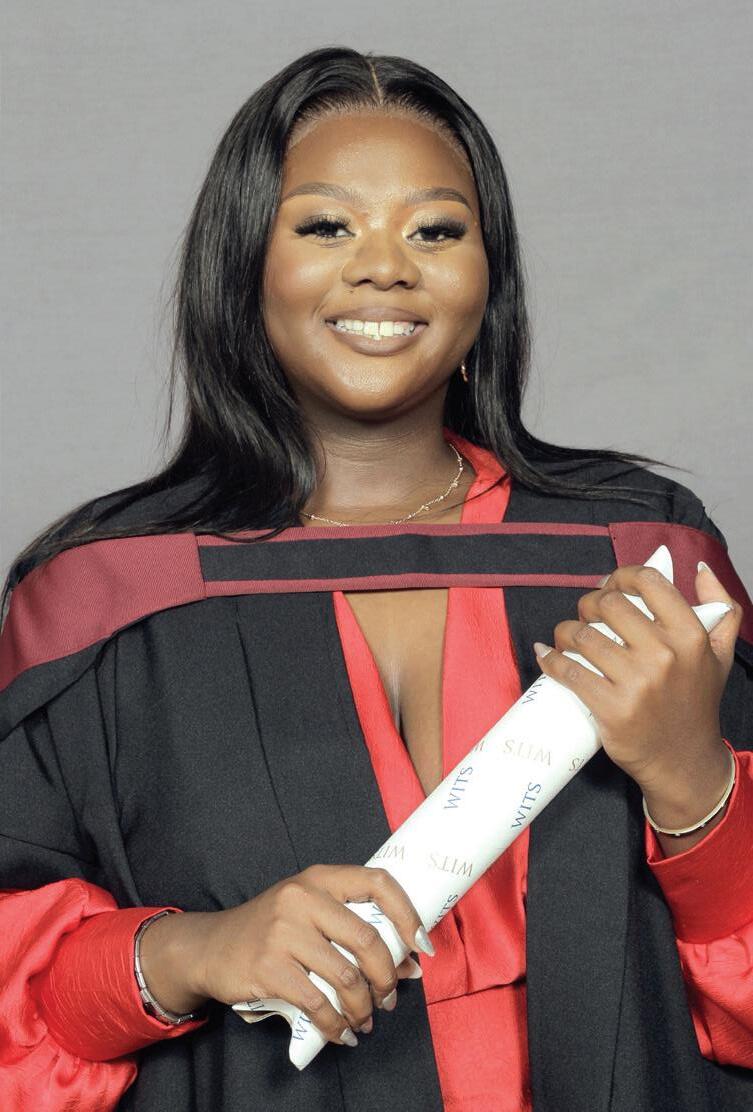
Lutya was born in Groote Schuur Hospital in 2000. She now lives in Johannesburg, after moving there in 2019 to study towards a bachelor’s degree in education at Wits University. She is continuing her postgraduate studies at Wits.
“I lived with my parents in Khayelitsha during my formative years, but due to my parent’s nancial situation and working hours, I moved in with my grandparents in Monte Vista. This was probably the best decision for my life. I went to better schools, lived in a safer neighbourhood and my quality of life improved greatly.”
She feels that she bene tted from democracy initially, but “as I age and I start to be independent, especially in my eld, I would say less and less”.
Lutya says: “My passion for education lies in the public sector, but I have seen how corruption prevails in these spaces. I also see how educators are treated. We are losing many excellent quali ed teachers because we are not paying people what they are worth and are placing them in unideal working environments.”
If she became president, she says, she would put lots of effort and funding into education reform.
“We need resources, infrastructure, technology, increased salaries, training and education. This is not just for primary education, but also further education and adult education.”
Benson grew up in Kewtown, Athlone, and now lives in Salt River. She has a diploma in public relations and communications from the Cape Peninsula University of Technology.
“I grew up in a three-bedroomed house with my grandparents (who raised me), my mother, my aunt and a few cats and dogs. I rst hated South Africa, but soon realised I did not know my country. Once I got to know South Africa – its beauty, its diversity and its people – my perspective changed.”
She believes democracy has treated her well. “I’m grateful I have the chance to walk freely, question systems and decide my worth and my path instead of having them chosen for me based on the colour of my skin.”
She believes that government should make more things free, such as education. “When I was in primary school, my parents struggled to pay my school fees. I would carry message books back and forth with notes from teacher to parent about outstanding fees. It made me feel like an expensive bill to be paid and I still feel that way today when I need to ask for help.”
Benson says she feels “nervously positive” about the future of South Africa.
Davids was born in Cape Town 25 years ago and has lived elsewhere in South Africa and in Brunei Darussalam and Australia. He is currently studying computer science in Amsterdam, the Netherlands.
Davids says his education was disrupted after he could not get into a South African university because none would recognise his International Baccalaureate diploma, even after it was approved by the South African Quali cations Agency. His studies at the Academic Institute of Excellence in Salt River were cut short by the COVID-19 pandemic. He eventually moved to the Vrije Universiteit in Amsterdam, where he is currently completing his thesis.
Davids says the idea of democracy and different types of democracies is something he has researched thoroughly over the last few years as his interest in politics has grown.
“I’M GRATEFUL I HAVE THE CHANCE TO WALK FREELY, QUESTION SYSTEMS AND DECIDE MY WORTH AND MY PATH INSTEAD OF HAVING THEM CHOSEN FOR ME BASED ON THE COLOUR OF MY SKIN. – JORDAN BENSON
“Being around for many Dutch elections has shown a clear example of a thoroughly developed democratic system that thrives on compromise and acceptance. It is unfair to compare the Dutch and South Africa. South Africa, as a democratic nation, is far too young to draw any conclusions of success or failure, but on the other hand, things have only worsened since I was born.
“South Africa’s democracy needs time to work before individuals can draw conclusions on whether it has helped them or not.”
He is positive about the future. “As the years go by and the scarred population embraces ideas free of shackles, we will witness a nation that can move freely toward the sunrise.”
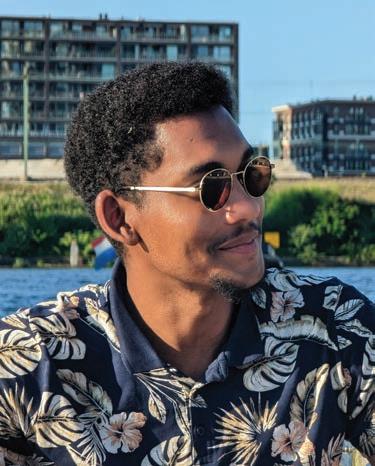
Jaftha was born in February 2001. She grew up in Northpine, Cape Town and, after moving around a bit, is back in Northpine. She is studying towards a BA in Humanities at Stellenbosch University.
Jaftha says: “I don’t think government is taking care of us. I say this because I have observed what happens before and after every election and until this day, I have not voted.
“Everything does not happen the way it was explained to the citizens, and we get let down yet again. We are a democratic state, however, all of the representatives have their own agendas or a subjective view of what South Africa should be.”
She feels the main priority of the president should be to strengthen the economy and change the education system so it becomes more career-focused.

Julius, who graduated from the Cape Peninsula University of Technology with a bachelor of education degree, was born and raised in a rural community, Elsenburg, on the outskirts of Stellenbosch. She currently lives in Maitland.
She says because she was born nearly 10 years after South Africa became a democratic country, “I did not have rst-hand experience of inequality or the hardships of apartheid.
“However, the effects remain. Segregation is still very much an issue. Access is still a problem. Despite these challenges, our democracy has presented many opportunities that were not there before. I received a state bursary and was able to further my studies.”
She is positive about the future. “Every country has its challenges. However, it is up to us to advocate for what we believe would make our country, and the world, a better place in the future.”
Russell was born in 1995 and raised by a single mother in Athlone, Cape Town. She now lives in Centurion, Gauteng. She obtained a degree in fashion media in 2018.
She says she is privileged to have been born free and grown up with adults who were activists and pioneers in their industries.
She says she is positive about the future of South Africa, “because I believe in our
potential as a nation. With the right leadership and change of values and taking care of what we have (people, resources, infrastructure, and so forth) we have the ability to develop and grow as a nation.”

Lok grew up in Hong Kong (15 years) and studied and worked in South Africa. She is uent in English, Mandarin and Cantonese and is learning isiZulu. She studied food science and technology at the University of Pretoria. She currently stays in Fourways, Johannesburg.
Lok says South Africa’s democracy “has failed to provide me, as a woman, with the sense of safety, justice and opportunity that I deserve. The harsh truth is that, as a woman, it often feels like this country harbours animosity towards me”.
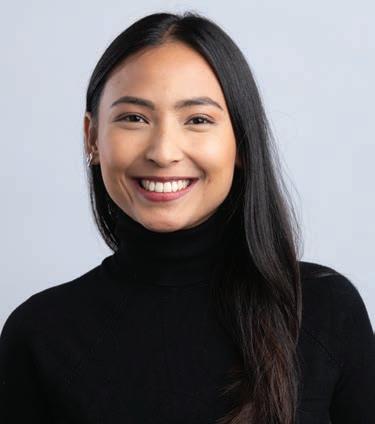
BE THE STORY BEHIND THE NUMBERS.
Shape narratives that impact the world beyond numbers.

we see your story of transforming youth through digital platforms.
Meet Oyena Dyasi, a SAICA Trainee and Youtuber committed to helping you plan and maximise your budget and achieve your dreams.
Oyena is not just any trainee, she’s a visionary using her platform to impart financial literacy, career advice, and guidance on diversity and inclusion. Through her YouTube channel, she empowers young people by making complex financial concepts accessible. She uses the power of numbers to shape new narratives on financial literacy, inspiring the next generation to achieve their dreams.
be a #differencemaker with a SAICA designation behind your name.







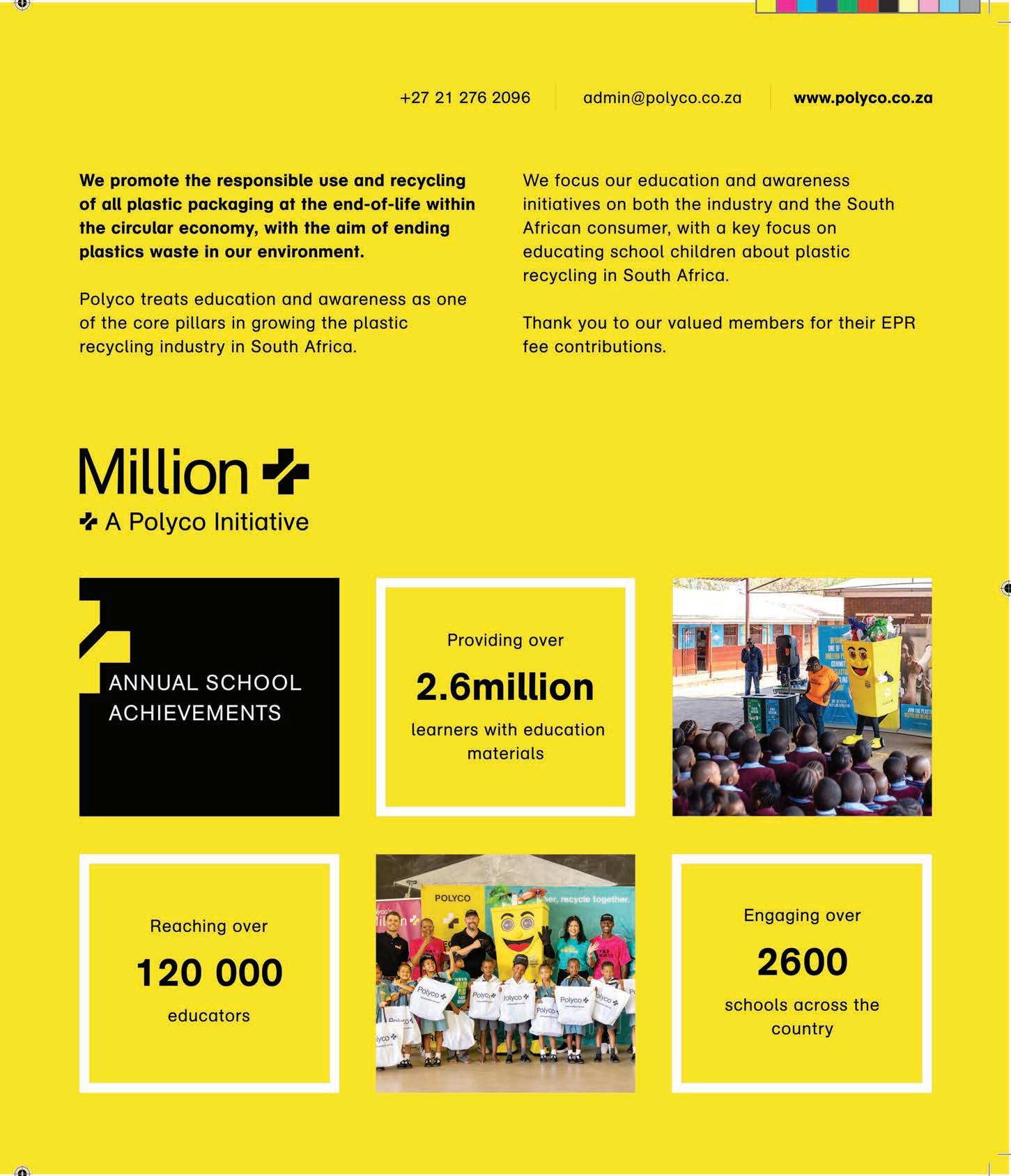

Agriculture and technology may seem like opposite ends of the employment spectrum, but TREVOR CRIGHTON discovers that these two sectors offer massive growth opportunities for young South Africans
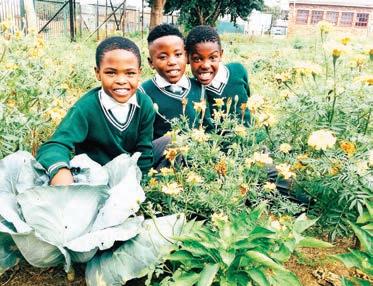
South Africa’s primary agricultural sector’s share of gross domestic product (GDP) was 2.4 per cent in 2022, according to Statistics South Africa. That makes it a R9.72-billion-a-year industry and one of the country’s top ve, behind mining, transport, energy, manufacturing and tourism.
The size of the country’s technology sector is hard to quantify – it’s nowhere near joining the head of the GDP pack – but it’s a sector that offers tremendous growth opportunities, particularly for young people.
On the agriculture side, Dr Marlene Louw, senior economist at Absa AgriBusiness, says the country needs not just more farmers, but also more technical specialists. “We are seeing a consolidation in farming enterprises where the size of farming operations is increasing, but the number of enterprises is decreasing due to the economies of scale required for ef ciency,” she says.
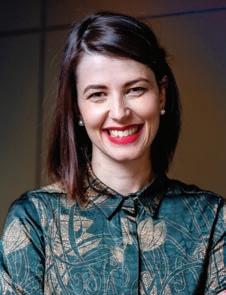
“To remain competitive, you need signi cant production volumes to justify the xed-cost investment.
Having said this, due to rapid technological developments, the agricultural industry is increasingly requiring specialists, such as agronomists, horticulturalists, environmentalists and data scientists, and there are
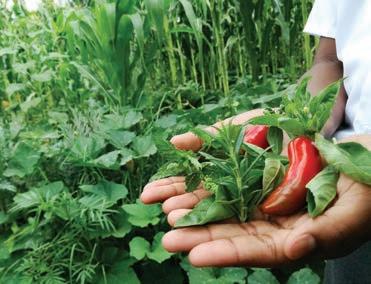
various opportunities for a lucrative career in the sector.”
There’s a link then between tech and farming that could provide a growth area for agriculture – and young people should be at the front of the queue. Dr Louw says agriculture offers diversity in terms of career choices and allows people to contribute towards the ultimate goal of feeding a rapidly expanding global population.
with the suggestion of setting up food gardens on their premises, aiming to provide the dual bene ts of supplementing school feeding schemes and teaching learners how to grow their own food.
“Farming isn’t often introduced to many young people during their formative years, leading them to perceive it as an occupation suited only for older individuals. Additionally, youth often prioritise immediate nancial gain and may be averse to engaging in activities that involve physical labour,” says Molepo.
While the agriculture sector needs to work to attract young blood, there’s no shortage of interest in the tech space in South Africa.

Robyn Hills, head of programmes, Food & Trees for Africa, agrees that there has been a growing recognition of the need to attract young people to agriculture.
She points speci cally to sustainable agriculture that supports the restoration of natural capital, such as healthy, fertile soil, leading to the development of various programmes and initiatives aimed at training, mentoring and nancing young farmers. Such programmes aim to break down barriers to entry and create pathways for youth to enter and thrive in the agricultural sector.
One of the many small agricultural businesses Food & Trees for Africa supports is Peter’s Gardening Project. Founder Peter Molepo approached area schools in Limpopo
Bloo Money – recently rebranded from Moya Money – is a quick, easy one-stop management and payment app for freelance workers.
Co-founder and CEO Thulani Masebenza founded the company in 2020, aged 25, and remains of the rm belief that technology offers great opportunities for young people.
“It democratises access to information, reduces the cost for youth to learn digital skills, such as programming or digital marketing, and also makes it easier for young people to either start businesses or access remote work opportunities, which is impactful for youth who exist in a job market with high unemployment,” he says.
“Being young gave us a better insight into the needs of freelancers for two reasons: the rst is that we had experience freelancing ourselves and could see that many young people were open to freelancing as a career option, especially with a lack of formal employment opportunities,” says Masebenza. “Secondly, 10 to 12 million African youth enter the workforce annually and a large proportion of these youth will work in the gig economy, opening new economic opportunities on our continent.”
“AGRICULTURE OFFERS DIVERSITY IN TERMS OF CAREER CHOICES AND ALLOWS PEOPLE TO CONTRIBUTE TOWARDS THE ULTIMATE GOAL OF FEEDING A RAPIDLY EXPANDING GLOBAL POPULATION.” – DR MARLENE LOUW
NADIA LUBOWSKI, director of the Anton Lubowski Educational Trust, sheds light on the critical issue of education inequality in South Africa and the urgent need to break the cycle of poverty through quality education

South Africa’s public education system is broken and has dismal educational outcomes, which perpetuate the cycle of unemployment, poverty and inequality. Children attending schools in more af uent areas typically receive a far superior education than those living in lower socioeconomic areas where the majority of schools are characterised by overcrowded classrooms, poorly maintained infrastructure, high rates of teacher absenteeism and educators without the required pedagogical knowledge.
South Africa has among the highest income inequality globally, with a Gini coef cient of around 0.67 and high rates of unemployment. According to Stats SA’s quarterly labour force survey for the rst quarter of 2024, the unemployment rate increased by 0.8 of a percentage point to 32.9 per cent from 32.1 per cent in the fourth quarter of 2023. The youth – those aged between 15 and 34 –are the most vulnerable in this respect, with youth unemployment sitting at 45.5 per cent in the rst quarter of 2024.
Part of the problem is a lack of employment opportunities in an economy that is not growing. The other, and arguably the bigger part of the problem, is a public education system that is no longer t for purpose and
fails the most vulnerable of our citizens, our nation’s children, from the outset.
Addressing South Africa’s multiple crises of unemployment, poverty, high levels of crime and growing inequality starts with ensuring every child can access early proper childhood care and education.
It also means ensuring children receive the necessary emotional and psychosocial support and that parents and caregivers in low-income communities are supported to provide this. Early childhood education that does not take a holistic view of the child will always be limited in its ability to ful l its mandate.
Sadly, this is a tall order given the state’s scal constraints, which have resulted in persistent cuts to basic education budgets. The 2024 national budget cuts school infrastructure spending and the budget for school infrastructure maintenance over the next three years. The Wits Public Economy Project says real government spending per learner has fallen in recent years from less than R24 000 in 2020 to R21 635 by 2025.
About ALET and Anton Lubowski’s legacy here
RE AD


This is con rmed by Equal Education and the Equal Education Law Centre. In a joint statement issued in response to the 2024 National Budget announcement, the two organisations said: “Even though education continues to be one of the biggest national spending items, basic education has been gradually falling off government’s priorities for a while now.”
The two organisations have called on government to reverse all cuts to the education budget, ensure that, at the very least, education budgets grow in line with in ation and learner enrolment and the value of the early childhood development subsidy is increased, and that nutrition support for children at all early childhood development (ECD) programmes is phased in.
Having worked as a principal at a childhood education centre in Philippi in the Western Cape for several years, I witnessed the challenges of ECD education in an impoverished community rst-hand. Together with the Anton Lubowski Educational Trust (ALET), I want to establish an early childhood development and family centre in Philippi that takes a holistic approach and helps the children coming through the centre reach their full potential and live a purposeful life while at the same time supporting their parents, guardians and caregivers, so that this next generation of children can break the cycle of poverty and deepening inequality that plagues this country.
By allowing the education crisis to continue festering, we violate the human rights of our children. It’s time for proactive action.
CRISES OF UNEMPLOYMENT, POVERTY, HIGH LEVELS OF CRIME AND GROWING INEQUALITY STARTS WITH ENSURING EVERY CHILD CAN ACCESS EARLY PROPER CHILDHOOD CARE AND EDUCATION.
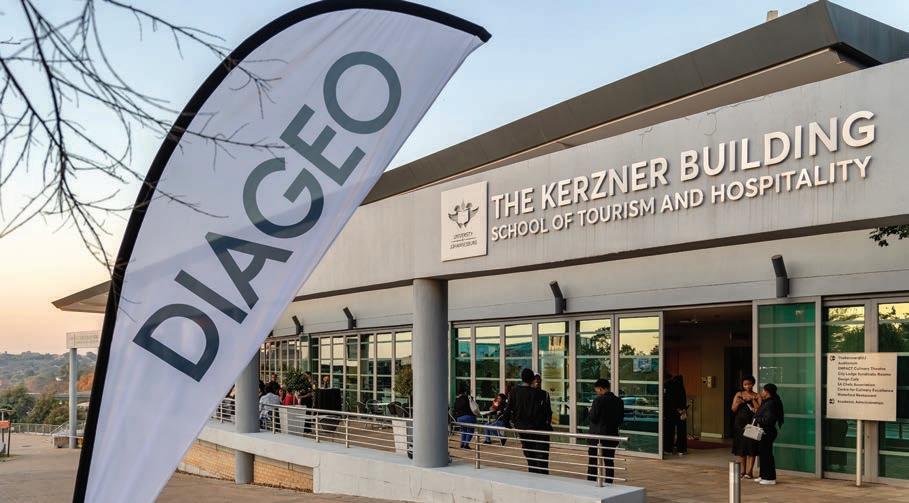
As South Africa commemorates Youth Day, we celebrate a significant milestone in the journey towards empowering young individuals and shaping the future of our country’s tourism industry, writes AMY MUDZAMIRI, sustainability manager –Southern Africa and Indian Ocean at Diageo
The Diageo Learning for Life programme empowers young individuals with customised training and mentorship aimed at aligning with their career goals. By partnering with local educational institutions and industry experts, the programme offers practical knowledge and real-world experiences in elds such as hospitality, tourism, bartending and customer service. Participants receive hands-on training in basic spirits, industry skills, food safety and job readiness, including interview preparation and con ict resolution.
In partnership with The School of Tourism and Hospitality (STH) at the University of Johannesburg, Diageo’s Learning for Life programme has successfully graduated 485 participants, addressing unemployment and skills shortages in South Africa’s vital tourism and hospitality sector. Professor Tembi Tichaawa, acting director of STH, emphasised that this initiative positively impacts nearly 500 households, illustrating the profound difference such programmes can make. Celebrating this success, Professor Tichaawa highlighted how collaboration, innovation and a commitment to excellence can drive industry progress and inspire future generations.

Diageo, a global leader in beverage alcohol, boasts an impressive lineup of brands. Founded in 1997 and headquartered in London, it operates in over 180 countries and is listed on the London and New York Stock Exchanges.
In 2020, Diageo launched its “Spirit of Progress” action plan, aimed at enhancing inclusivity and sustainability through 25 targets, including improving the employability and livelihoods of 200 000 people. The company is committed to gender diversity, with women constituting 50 per cent of its board and 40 per cent of its executive committee. Diageo was the first alcohol company to endorse the UN’s Women’s Empowerment Principles in 2013.
Elevating employment opportunities in the hospitality sector is crucial for sustainable growth and national development.


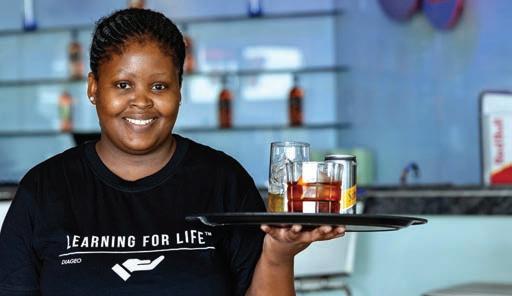
By cultivating a skilled workforce, we enhance service standards and transform the industry into a vibrant, innovative and competitive landscape. This shift creates jobs and builds careers and aspirations, attracting tourists, boosting local businesses and fostering economic dynamism.
The participants’ excellence and passion drive innovation and contribute directly to the nation’s economic progress, aligning with our collective vision for a prosperous future.
Initiatives like Learning for Life highlight the transformative power of collaboration between industry partners and educational institutions, shaping a brighter future for South Africa’s hospitality sector. By empowering individuals and building a skilled workforce, these efforts drive economic growth and prosperity.
Through unity, innovation and a shared commitment to excellence, we can push boundaries and inspire future generations.
Cheers to a brighter future for South Africa’s tourism industry!



For more information: 076 020 0280 Amy.Mudzamiri@diageo.com www.diageo.com
A passion for numbers and critical thinking propelled Thandeka Buthelezi’s career to a coveted CGMA designation, writes HAPPY ZONDI
Thandeka Buthelezi’s journey into the world of nance and accounting began with a natural aptitude for numbers and an inherent understanding of the accounting equation during her high school years.
Aged 32, she is MTN Group’s global HR consultant for planning, reporting and analytics. In her role, Buthelezi is responsible for solving various HR challenges and identifying opportunities for her organisation, including collecting and analysing HR data to create reports that inform decision-making and contribute to strategic initiatives.
Buthelezi recalls: “I performed really well in accounting in high school. The accounting equation just made sense to me. It was a natural progression to pursue a quali cation in accounting when I started varsity.”
Her academic journey was marked by a deep fascination for the intricacies of cost and management accounting, particularly in manufacturing.
“As an undergraduate student, one of my favourite modules was cost and management accounting, particularly when it pertained to manufacturing. The concept of producing a nal product from raw materials fascinated me. I loved Mrs H S Ball’s Peach Chutney, and I was curious about the price difference between a peach for consumption and a bottle of chutney after processing.”
It was this curiosity and passion to understand the nancial aspects of production processes that set the foundation for her future career in nance and accounting.
Buthelezi’s enthusiasm for the accounting and nance profession extends beyond the
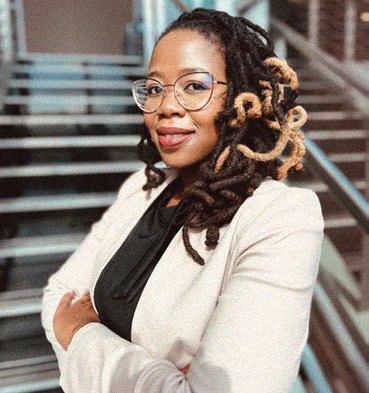
classroom. She is particularly drawn to the versatility and breadth of opportunities the eld offers.
“The profession does not limit me to one sector as accounting and nance cuts across all industries, sectors (private and public), and organisational sizes. The exposure to corporate and government spaces is endless,” she adds.
Buthelezi notes that automation and AI have changed the role of nance and accounting professionals in businesses. She adds that her path to becoming a Chartered Global Management Accountant (CGMA) showed her how important critical thinking is, especially with big data included in the curriculum.
“One of the key skills the CGMA professional quali cation with The Chartered Institute of Management Accountants (CIMA) harnessed on the journey to acquiring the
“THE PROFESSION DOES NOT LIMIT ME TO ONE SECTOR AS ACCOUNTING AND FINANCE CUTS ACROSS ALL INDUSTRIES, SECTORS (PRIVATE AND PUBLIC), AND ORGANISATIONAL SIZES. THE EXPOSURE TO CORPORATE AND GOVERNMENT SPACES IS ENDLESS.” – THANDEK A BUTHELEZI
CGMA designation was critical thinking. This was further sharpened with the introduction of big data as a topic of study in the syllabus. In my current role in planning, reporting and analytics, I add value through the critical thinking applied to data analytics,” she adds.
Buthelezi’s ability to analyse complex data sets and derive actionable insights has been instrumental in her contributions to MTN’s business success.
“The ability to make informed decisions based on data is a key asset in today’s business environment,” she adds.
Her decision to pursue the CGMA designation was driven by her desire for career progression and recognition. “The CGMA designation is a reputable, globally acknowledged credential and has enabled me to advance my career in line with my goals,” adds Buthelezi.
The CGMA professional quali cation has not only given her the CGMA designation, but also provided her with the critical skills and knowledge needed to excel in delivering the business insights essential for decision-making.
“It has also equipped me with technical, business and people skills that are valued and sought-after across industries. It has opened up endless career opportunities for me. As a CIMA member, I have access to other passionate accounting and nance professionals globally with whom I can network and learn. The skills and competencies gained have also enabled me to navigate the complexities of the nance and accounting profession with con dence,” says Buthelezi.
She encourages aspiring nance and accounting professionals to pursue the CGMA professional quali cation, which can open up many job opportunities and roles in various industries.
“I hope my story serves as an inspiration to young professionals and aspiring accountants, demonstrating that with dedication and the right opportunities, one can achieve remarkable success in the nance and accounting profession,” she concludes.
Ensuring graduates have the necessary abilities is crucial, especially in the fast-paced field of information technology, argues CG SELVA GANESH, VP, CEO South Africa at In2IT Technologies
Mentorship is a crucial link in giving students the real-world knowledge and soft skills needed to work with clients. By working together, educational institutions, learnership providers and government bodies can develop a workforce that can navigate the job market. This necessitates a paradigm shift in which learners view learnerships as long-term professional advancement opportunities rather than just temporary experiences, bolstered by comprehensive training and mentorship programmes.

Many learnership participants encounter hurdles when transitioning from their programmes to stable employment. Challenges include a lack of funding for the right programmes and a disconnect between the skills taught and the needs of the economy. Moreover, the rapid evolution of technology often renders certain skills obsolete by the time learners complete their programmes. Addressing these challenges requires a multifaceted approach. There is a pressing need for comprehensive training programmes that are agile and responsive to the evolving demands of the information technology (IT) sector. There is also a need to create curricula that align with current market needs, ensuring that learners are prepared adequately for the realities of the job market.
In industries such as IT, junior employees often grapple with barriers, such as technical complexity, communication challenges and con dence issues, when working directly with
THERE
Rajan Naidoo, managing director of EduPower Skills Academy, outlines three reasons why learnerships hold huge potential for addressing the skills gap:
1. Learnerships bridge theory and practice: these programmes offer a unique blend of theoretical knowledge and practical on-the-job training. Candidates gain hands-on experience in their chosen fields while acquiring the skills and competencies demanded by employers.
2. Industry-relevant training: learnerships are designed in close collaboration with industry partners, ensuring that the skills taught align with the job market’s needs. By tailoring theoretical and practical training to specific industries and roles, learnerships can produce job-ready candidates with hands-on skills.
clients. Mentorship programmes can bridge this gap by providing guidance on necessary abilities and tactics, ultimately making graduates more job-ready and facilitating their integration into the workforce.
Corporate social investment is paramount in empowering learnership participants for sustainable careers. Through initiatives, such as facilitating work placements, providing comprehensive training and offering mentorship opportunities, companies can build a talent pipeline and contribute to long-term employee retention.
By investing in graduates and internships, companies not only ful l their social responsibility, but also reap the rewards of a skilled and diverse workforce.
Comprehensive training programmes form the foundation to equip learnership participants with the necessary skills and job readiness. These programmes should de ne focus areas, build awareness, boost engagement
IS A PRESSING NEED FOR COMPREHENSIVE TRAINING PROGRAMMES THAT ARE AGILE AND RESPONSIVE TO THE EVOLVING DEMANDS OF THE INFORMATION TECHNOLOGY SECTOR.
3. Promoting employment opportunities: learnerships provide participants with a direct pathway to employment. Companies often use learnerships to create a talent pipeline to future-proof their businesses with the required skills. They absorb learnership graduates into permanent positions, leveraging the skills they acquired during the programme. This can help to reduce the unemployment rate while simultaneously addressing skills shortages.
and reinforce progress. Strategies, such as needs analysis, clear learning objectives and regular evaluation, ensure that training programmes are effective and impactful in preparing graduates for the workforce.
Learners need to move beyond viewing learnership programmes solely as avenues for temporary stipends and rather embrace a mindset geared towards long-term career trajectories. Corporate investment assists greatly in nurturing sustainable careers with a focus on work placements, comprehensive training and mentorship opportunities. Through concerted efforts from society and government entities, including promoting inclusivity and prioritising long-term career growth, stakeholders can contribute to fostering a workforce that is resilient, adaptable and primed for success in the ever-evolving employment landscape.
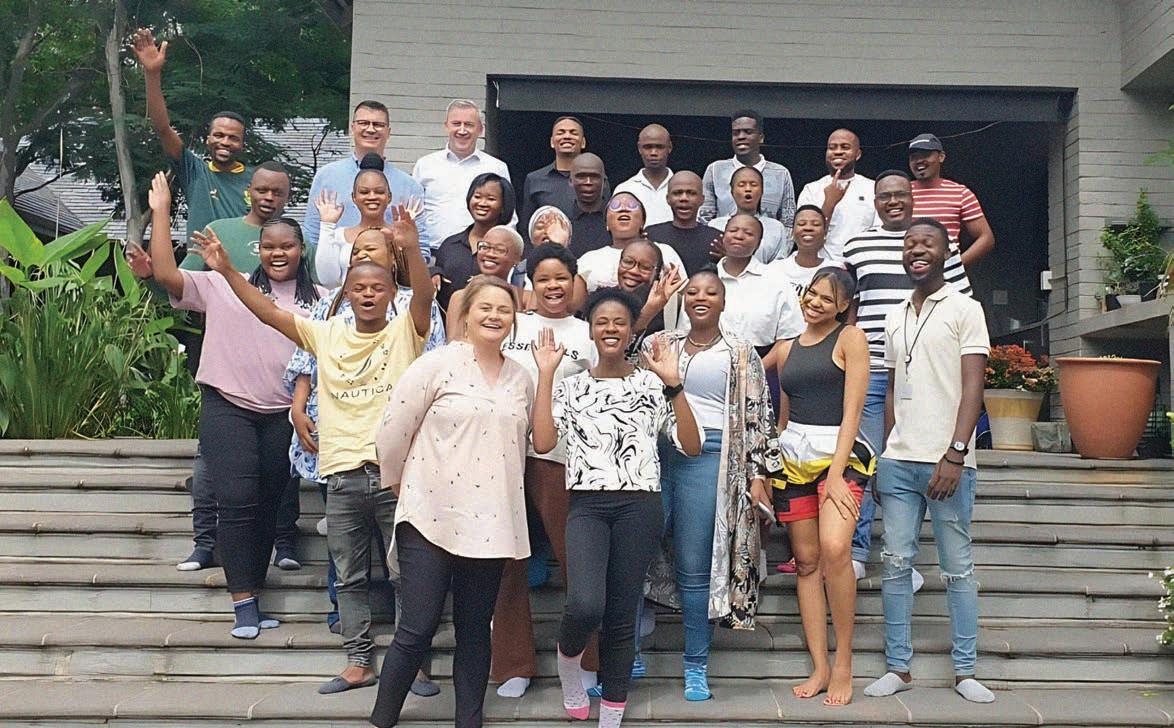
COMPUTERSHARE relates how it empowers youth and tackles unclaimed assets to build a brighter future
Good governance comes through good design – a philosophy nurtured by Computershare to invest in people and innovative solutions to strengthen the nancial markets and deliver meaningful change.
By combining youth development with a solution-orientated approach to tackle market challenges and help South African issuers strengthen their governance frameworks, Computershare demonstrates a commitment to building a brighter future on multiple fronts.
One such challenge for South Africa’s nancial markets is in unclaimed assets, with unclaimed dividends alone exceeding R4-billion as highlighted in a whitepaper by the Financial Sector Conduct Authority (FSCA).
The conundrum exists where thousands of shareholders have not been paid for assets such as dividends or share buybacks and the issuers, desperately trying to locate and pay their “lost’” shareholders, are sitting on a growing liability affecting their balance sheets, while impacting
governance responsibilities as shareholders remain disengaged.
Numerous reasons can result in a lost shareholder. They can move or relocate, change bank accounts, mobile numbers, email addresses or their personal details following marriage or other legal processes. They may not update these changes with the respective issuers. If shareholders pass away and their shareholding is not in their estates, the executor will be unaware.
With the FSCA engaging various market participants and placing greater emphasis on the need for a co-ordinated approach to identify, manage and minimise dormant and unclaimed assets, there is a greater urgency for issuers to reduce the amount of unclaimed assets.
Several years ago, Computershare began addressing the broader issue of unclaimed assets – identifying, verifying and tracing thousands of shareholders entitled to unclaimed assets. In the past ve years alone, Computershare has already facilitated payments exceeding R1-billion to legitimate shareholders.
Computershare understands the importance of both youth development and tackling signi cant market issues. Its youth-focused programmes are designed to equip young graduates with the skills and con dence needed to thrive in the professional world. Each year, Computershare enables graduates to gain workplace experience, serving a purpose that makes a difference to the market. Its focus on building a talented pipeline of skills in South Africa’s nancial markets doesn’t start and end with the workplace experience of graduates; it extends to nurturing skills through the years leading up to graduation.
Through learnership programmes and bursaries, young individuals are exposed to Computershare to enable them to further their studies. In 2024, there were 49 external bursary recipients and 16 internal recipients. Once graduated, individuals have the chance to join Computershare’s graduate programme, aligned to the national Yes-4-Youth (Y4Y) Initiative, for a year. Some are then granted an opportunity to be absorbed into the company’s talent pipeline. Computershare currently has 30 graduates in its Y4Y graduate programme.
After graduation, students can apply to the programme. One of the rst criteria is nding a marriage between the technical skills and quali cations of the applicants and the strategic requirements of the business. This is complemented by an interview process to assess for a cultural and behavioural t. Once formally selected, students embark on a year-long development programme. This immersive experience begins with a threeday on-boarding session introducing them to Computershare’s company culture, core values and operational structure, followed by a skills development phase, where graduates receive prescribed training and learnerships.
The programme goes beyond technical expertise by incorporating life-coaching sessions that foster business acumen, communication skills and critical thinking.
ONCE GRADUATED, INDIVIDUALS HAVE THE CHANCE TO JOIN COMPUTERSHARE’S GRADUATE PROGRAMME, ALIGNED TO THE NATIONAL YES-4-YOUTH INITIATIVE, FOR A YEAR.
While graduates may have excelled in their studies and can provide a strong theoretical background, they still need to gain workplace experience. Hands-on work experience allows graduates to apply their knowledge, develop their expertise in real-world settings and foster a well-rounded understanding of the nancial services industry.
Computershare encourages them to build courage and charisma to engage the company and ask questions that could transform and future-proof the business and also help colleagues think differently.
Investing in young people is an investment in the future. Their skills, energy and fresh perspectives are the driving force behind innovation and progress.
One of the teams graduates may encounter and collaborate with during their time at Computershare is the asset reuni cation one. This team has led initiatives for the veri cation and updating of more than 204 800 records with the latest mobile numbers, email addresses, IDs and deceased status. Having the latest contact information opens communication with shareholders and further improves governance practices. With up-to-date details, shareholders receive vital corporate information about companies they invest in and information about upcoming AGMs where they can vote on resolutions, enabling informed decisions and active shareholder participation.
Several stories have emerged from shareholders bene tting from Computershare’s efforts, after receiving the news that they have unclaimed assets owed to them.
One shareholder was planning to take out a bank loan so his daughter could continue university, as he could no longer afford the tuition fees. His unclaimed dividend payments enabled him to pay her university tuition.
With the tougher market conditions, another shareholder had lost his income and was facing losing his house, but then received a substantial dividend payment, which avoided the loss.
Another shareholder used the payment received to save their business and continue employing their staff. Elsewhere, a student
who inherited shares was contacted and surprised by the amount of unclaimed assets owed to her.
Investing in technology and talent, Computershare has scaled its asset reuni cation efforts to meet market demands effectively. In addition, Computershare has been actively engaging market participants to meet nancial market development objectives, participating in industry discussions and regulatory compliance, re ecting its commitment to contributing to broader nancial sector goals.
With people and technology at the core of Computershare’s good governance and good design philosophy, Computershare’s dedication extends beyond providing services. In its commitment to fostering talent and social responsibility, Computershare continues to invest in Y4Y graduates and build their nancial literacy and skills development while sharing meaningful insight with the industry to contribute to broader nancial goals. Computershare’s approach to empowering young talent strengthens the nancial sector and demonstrates its dedication to youth upliftment and development and building a sustainable pipeline of quality talent for the industry.


Scan for more infomation on the graduate programme

For more information: www.computershare.com/za

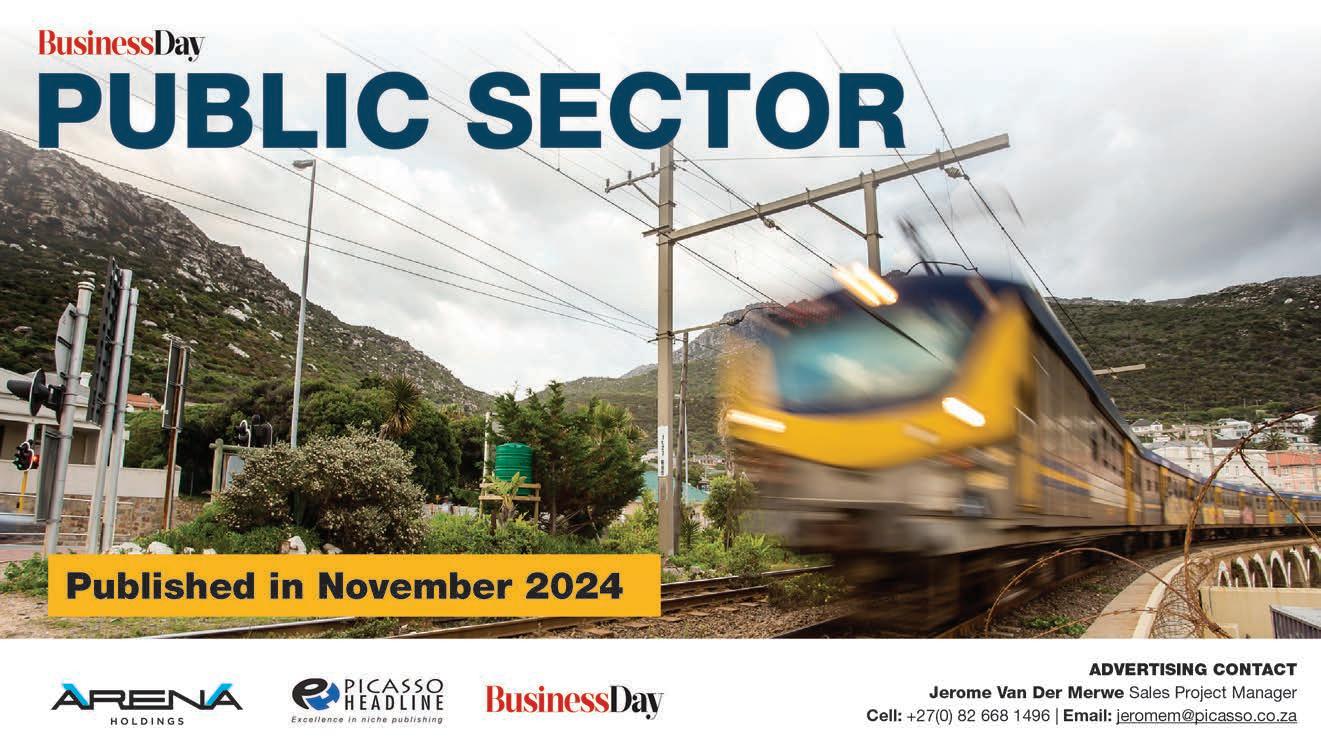
HAPPY ZONDI spoke to two company representatives invested in the All4YOUthSSA initiative and other programmes, aimed at helping young people to access training and employment opportunities
When Bruce Toerien walked into a recruitment agency after completing his studies, he never imagined he would nd his rst job – working for the agency. Now, 27 years later, he is the managing director of Adcorp’s Contingent Staf ng Division, a position he’s embraced wholeheartedly.
“This isn’t just a job; it’s a passion. I love the dynamic nature of interacting with people and teams, the thrill of collaborating with like-minded organisations and the satisfaction of facilitating work opportunities,” says Toerien.
Adcorp’s contingent division is heavily invested in youth employment, aligning with client needs in this cyclical and often seasonal environment.
Toerien explains: “Our involvement with initiatives such as the Alliance for YOUTH or All4YOUth programme, spearheaded by Nestlé, underscores our commitment to recognising the value of youth within our workforces. By fostering partnerships with corporate giants, such as Nestlé, we create an environment where young people can access employment and gain valuable insights into the modern workplace.
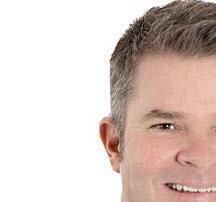

”Discussing Adcorp’s presence in sub-Saharan Africa, Toerien emphasises the company’s reach and its ability to align with client demands across
“Our goal is to reach and impact at least 10 million young people worldwide by 2030 through our various initiatives.” – Comfort Tshisikule
expansion and ensure consistent service delivery.
With a workforce of over 40 000 individuals and servicing more than 1 000 operational sites, Adcorp is primed for substantial growth, leveraging its expansive reach to cater to a diverse clientele.
Toerien says: “Adcorp is additionally deeply invested in supporting youth access to quality education and training. Through various skills development initiatives, we empower young individuals, especially those from disadvantaged backgrounds, with the tools they need to thrive in the workplace.”
sub-Saharan Africa to identify common solutions to increase their opportunities, especially for those below the age of 30,” she explains.
This collaborative approach, says Tshisikule, underscores the importance of working with like-minded organisations to create sustainable economic opportunities for the youth.
“Our goal is to reach and impact at least 10 million young people worldwide by 2030 through our various initiatives in employment, agripreneurship and entrepreneurship,” she says.
“In 2023, we celebrated the 10th anniversary of our successful Nestlé Needs YOUth initiative and its positive impact.
“Through our Alliance partnership, especially with initiatives such as the All4Hustlers campaign, we have reached and impacted over 35 000 young entrepreneurs,” says Tshisikule.
Apart from the youth, Nestlé also offers a programme to empower young SMEs and entrepreneurs, offering them business opportunities and support to gain market access and networks.
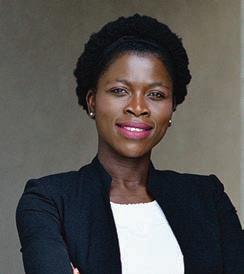
“Through our Nestlé Future Talent bursary, we also support young people studying towards STEMI (science, technology, engineering, mathematics and innovation) programmes. These graduates often join Nestlé’s graduate development or internship programmes, further building their career pathways.
Stressing the company’s unwavering commitment to driving positive change in the workplace, Toerien says: “We’re not just recruiters; we’re enablers of opportunity.”
“Nestlé also runs graduate, internship and apprenticeship programmes to build a future talent pipeline for the business. In partnership with the Production Management Institute of Southern Africa, we also offer a differently-abled learnership programme to support unemployed youth with disabilities,” she adds.
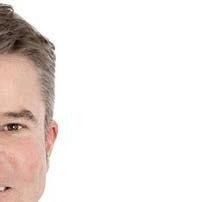
various regions.
Beyond compliance and contract management, the company has a proactive approach to forging alliances with tech-savvy partners across the continent to enable


Comfort Tshisikule, youth and learning & development lead at Nestlé East and Southern Africa Region, shares her insights on the Alliance for YOUth programme and its impact on young people in the region. A proud product of Nestlé’s graduate programme, Tshisikule started as a graduate trainee 15 years ago.
“Alliance for YOUth is a business-driven movement promoting a better transition from education and training to employment. We collaborate with companies throughout
PAWA AFRICA, a young small, medium enterprise, is the proud implementation partner of All4YOUthSSA. The team works with bene ciaries and partner representatives such as Bruce Toerien and Comfort Tshisikule to carry out initiatives focused to unlocking opportunities for youth.
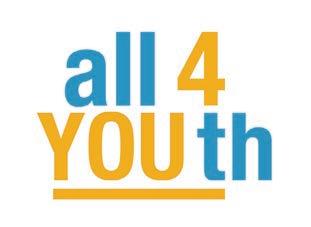
Business leaders within the private sector argue that equipping youth with development opportunities is key to economic growth.
By Candice Luis, business director at Orange Ink
Young people’s potential as catalysts for change cannot be underestimated, and motivating and empowering the youth to transform their social impact ideas into actionable elements is integral to society’s development and driving sustainable economic growth.
World Youth Skills Day, taking place on 15 July, is a reminder of the need to not only provide skills for the youth, but also open up access and opportunities as they transition into the workplace and their communities to drive a transformative future. Organisations doing exactly this, weigh in.
“If we consider that the 2030 Agenda for Sustainable Development aims to eliminate inequalities when it comes to education and drive equal access to all levels of education, then we have to ask, how are we going to make sure we get there if, according to an overview of the education system 2023 report, only 4 per cent of 15–19 year olds are enrolled in secondary education, and 51 per cent of South Africa’s youth (Statistics SA) don’t have the nancial capability to fund their tertiary education,” asks Dr Candice Hartley, head of people at KPMG South Africa.
into opportunities that can help facilitate the development of much-needed skills, leaving them more empowered to change their lives for the better.
“Many bene ciaries have quali ed in areas they would not have otherwise studied had it not been for our efforts through initiatives such as Investec’s partnership with the Kutlwanong Centre for Maths, Science and Technology (Investec Promaths), which seeks to drive change that will see several disadvantaged youths produce improved matric results, access tertiary education and pursue critical quali cations.”
Hartley adds: “Education programmes that encourage core competencies are critical to supporting growth in the system, but similarly, ensuring job opportunities beyond a tertiary education is just as critical – moving the youth from employable to employed. Therefore, graduate programmes that bring graduates from the classroom into the real world of work, giving them practical experience and insight, is a fundamental pillar to creating real opportunities for change.”

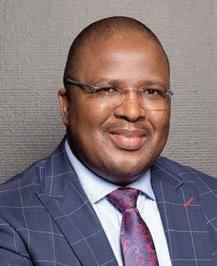
One of the best ways to help youth and level the playing eld is to give them access to educational support programmes aimed at lling the de cit resulting from a challenged public education system, comments Setlogane Manchidi, head of CSI at Investec.
“We believe the support of carefully considered educational initiatives enables our youth to be better positioned to gain entry
Manchidi agrees. “There must be a continuum of initiatives, starting from high school, moving to tertiary education and continuing to young adult learning – a progressive pipeline, spanning three stages of learning and growth to create opportunities for young people to become active economic participants in society.
“In addition to equipping the youth, we recognise and appreciate that the role teachers, trainers and educators play in providing skills for youth is a critical one. Hence our commitment to the development of a new cohort of maths and science teachers through our teacher internship programme that ensures educators can provide high-impact learning experiences that support holistic growth for the workplace of the future.”
“SKILLS DEVELOPMENT IN FINANCIAL INDEPENDENCE AND CREATING A MINDSET FOR THE NEXT GENERATION IS A CRITICAL SKILL SET WE NEED TO IMPART TO OUR YOUTH.” – BRINA BIGGS
Overview of the South African Education System

Statistics SA report on higher education and skills

Brina Biggs, senior manager at 1Life, agrees, saying it’s not only about active participation, but also encouraging a view of the future –something that can be dif cult when you’re young and have your whole life ahead of you.
“Skills development in nancial independence and creating a mindset for the next generation is a critical skill set we need to impart to our youth. Access and opportunities open doors, skills help them succeed and commitment to nancial freedom and the creation of generational wealth protects their futures,” says Biggs.
“Beyond creating workplace opportunities, however, there is no doubt that sport has the power to motivate and inspire communities and plays a fundamental role in the healthy development of young minds as well as presenting key career opportunities.
“This is why we also need the backing of strong talent in the eld by brands – backing that supports the growth of talent on various levels and the participation of South Africa’s youth on a global stage,” concludes Thati Zulu, Red Bull eld hockey athlete and Olympian

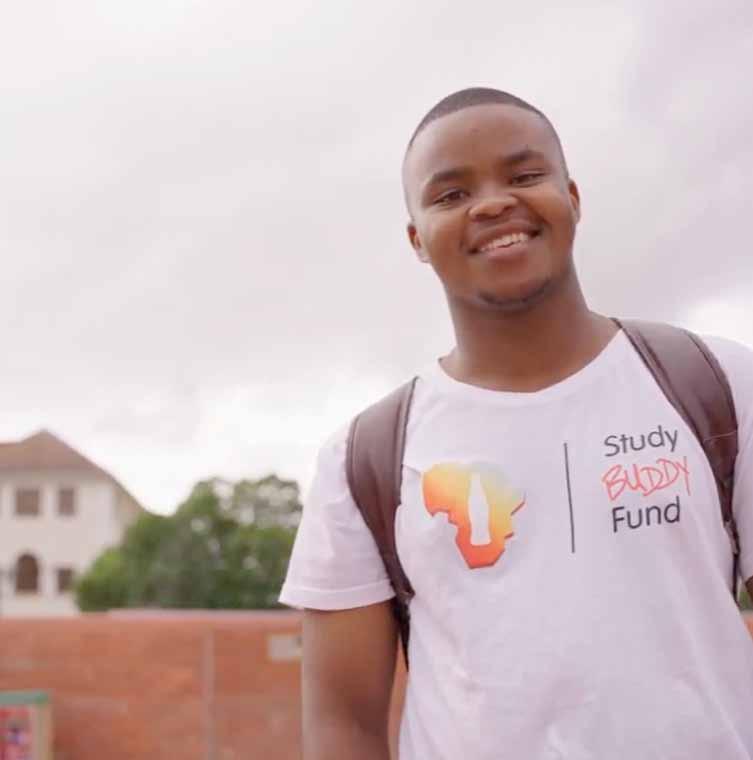

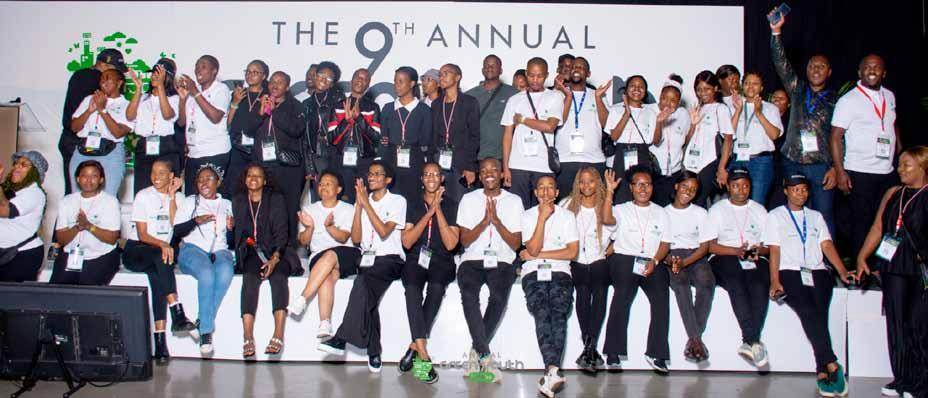
At Coca-Cola Beverages South Africa we are committed to building economic inclusion and sustainability solutions that benefit our stakeholders, in particular, the communities in which we are invested.
Part of the Coca-Cola system, Coca-Cola Beverages South Africa (CCBSA) has a strong history of enhanc ing the livelihoods of the people in the communities we proudly serve. We continue to help enable the economic empowerment of a diverse network of customers, suppliers and communities across our value chain.
We have adopted the two pillars of employability and entrepreneurship as a framework for our economic inclusion strategy. Through programmes, such as Bizniz in a Box and our Study Buddy Fund, we enable women and young people to access better future opportunities. Also, through our support for small suppliers to our business, we are providing meaningful economic opportunities and enhanced livelihoods.
We are committed to developing sustainable ways to produce, distribute and sell our products and create shared value for the business and the communities where we operate.
Our Study Buddy Fund comprises four pillars.
1. Bursary programme
The bursary programme offers financial support to academically strong students from disadvantaged backgrounds who meet university entry requirements.
2. University partnership
Through partnerships with universities, funding is made available to enrolled students who face financial challenges and lack access to bursaries or support from the National Student Financial Aid Scheme.
3. Technical and vocational education and training college support
This supports young people who do not meet university entrance requirements by focusing on technical skills development tailored to the CCBSA value chain, including fields such as electrical and mechanical engineering.
4. Ligbron E-learning programme
We use e-learning to improve the teaching and learning of mathematics and science.
CCBSA launched the Bizniz in a Box (BiB) initiative in 2016 to support small businesses, particularly those run by youth and women.
Bizniz in a Box’s primary focus is to create an ecosystem of viable microbusinesses offering complementary products and services in a community, using a spaza shop as the anchor. Each business operates out of a custom-designed container.
Since its inception, CCBSA has supported hundreds of entrepreneurs across a number of provinces, including Limpopo, Gauteng, Mpumalanga, Eastern Cape and KwaZulu-Natal.
At CCBSA, we aim to strengthen local procurement, enhance local supplier development programmes and increase financial support. We do this in a number of ways, including
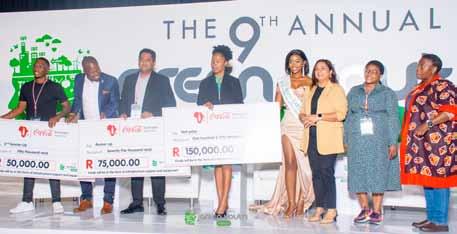
WE HAVE ADOPTED THE TWO PILLARS OF EMPLOYABILITY AND ENTREPRENEURSHIP AS A FRAMEWORK FOR OUR ECONOMIC INCLUSION STRATEGY.
by identifying and addressing some of the obstacles small, medium and micro enterprises (SMMEs) face, such as access to funding and markets.
We have designed programmes such as our SMME fund, Khulanathi, to accelerate the growth and development of SMMEs. Khulanathi means “grow with us” in isiZulu.
We also run regional supplier skills summits where entrepreneurs participate in a series of workshops focused on capacity-building and skills development programmes, as well as business leadership content and insights. Each supplier skills summit is followed by an access to markets boot camp, an exclusive networking event that connects SMMEs with senior executives of South African businesses to help facilitate introductions and engagement around opportunities offered by large corporates. Another programme we have invested in is our Enterprise Supplier Development Postgraduate Diploma in Management Practice, run in conjunction with the Henley Business School.
These form part of our transformation and sustainability journey as we look to empower SMME owners with the knowledge, insights and skills to allow them to grow their businesses.
By supporting and growing SMMEs, we can help unlock a better future for enterprising individuals, their families and employees, as well as the wider community. Economic growth is vital to the socioeconomic wellbeing of communities.
People matter. Our planet matters. We believe in doing business the right way by following our values and working toward solutions that benefit us all.

